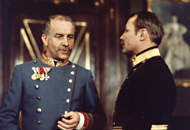Music & Musil
Music seems to be always subtly present in the background of Musil’s story, from the songs of Leona to the vague impression of waltzes in Diotima’s salon. However, music becomes very prominent in the relationship of Walter and Clarisse. Their relationship is defined through music; the music they play together and the music they play apart. The music binds and solidifies their relationship but it also drives them apart.
Clarisse was always sure that Walter was a genius, everything always came easily to him, yet he is never actually able capitalize on this genius. On the other hand, Clarisse is highly motivated, she does not think she is talented, but she drives herself to learn. Musil says, “…she saw genius as a question of willpower.” She forced herself to learn to play piano and to learn to paint. She recognizes that Walter is just a bureaucratic hack, he has no willpower and no drive, and it is killing her both mentally and emotionally. Her aversion to Wagner comes from a dislike of “…everything voluptuary in art…” She yearns for simple clean lines, both in art and in music. Nevertheless, this is only part of it, she also dislikes Wagner because she recognizes his genius, the same genius that Walter is incapable of ever having.
I think that Clarisse is probably the true genius in the relationship, but she cannot, or does not see it in herself. She is driven to succeed. She analyzes her relationship with the world, with music, and with art. She recognizes that Walter has no such thoughts, he is wrapped up in music, but he cannot express why even to himself, and he cannot create music or paintings. Clarisse realizes that without music they would have nothing together, and she is ashamed of her failure to learn the truth about Walter's "genius" before her marriage.



1 comment:
Although we were talking about Schnitzler's Reigen in class this morning, I was thinking about poor Walter. I realized that his problem with creativity, whether music or art, is the same problem that Hoffmannsthal has with language. Walter cannot create anything because he cannot move past his inability to capture truthful emotions. He is trapped by his own recognition that he cannot do anything better than what has already come before. His "genius" is not great enough to overcome his lack of self confidence. Clarisse sees this and tries to raise his self esteem, but she is powerless. Perhaps her dislike of Wagner comes from her realization that as long as Walter keeps playing his works, he will not create anything new of his own. She tries to draw him away from Wagner, but despite her threats, he cannot overcome his own inabilities.
Post a Comment